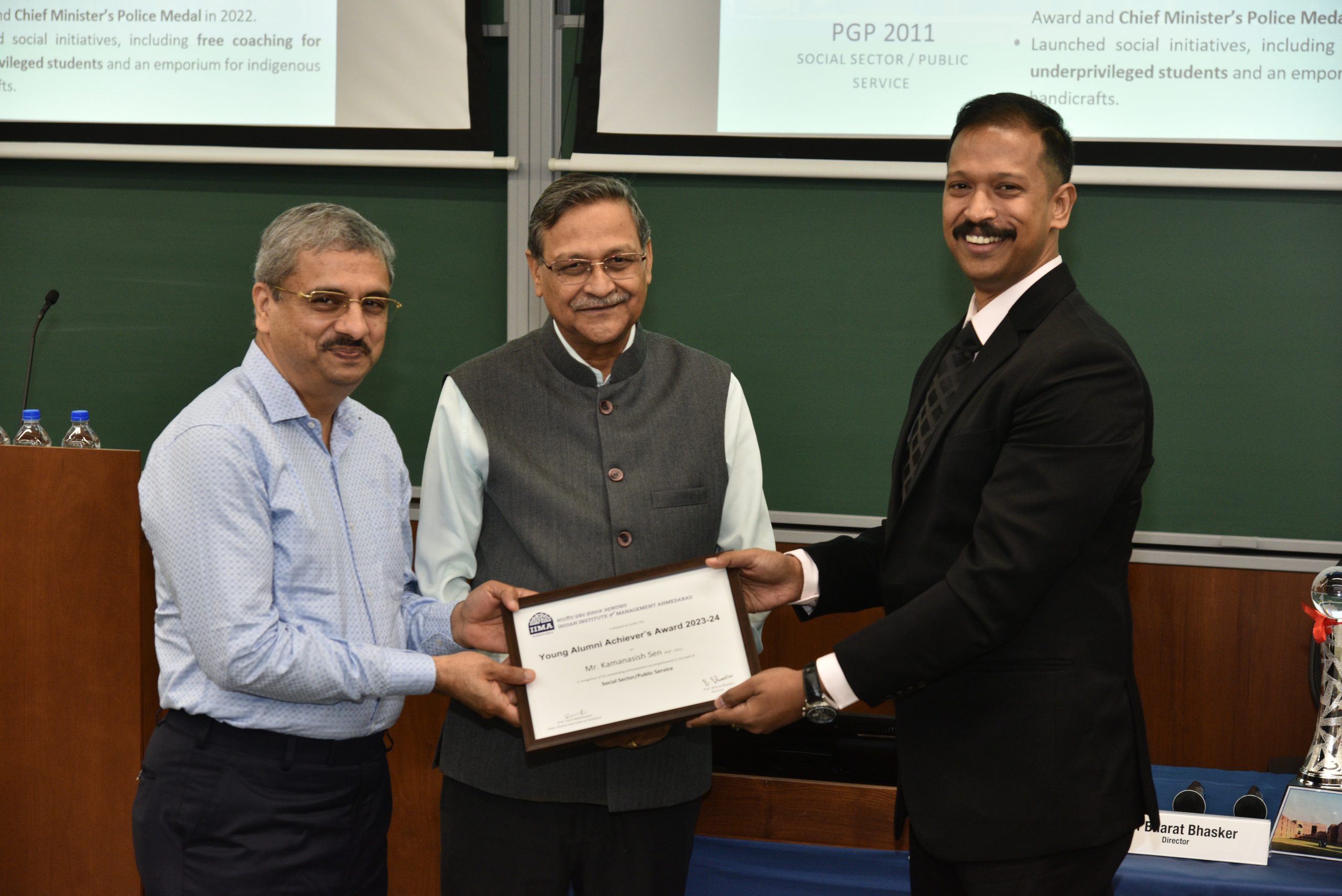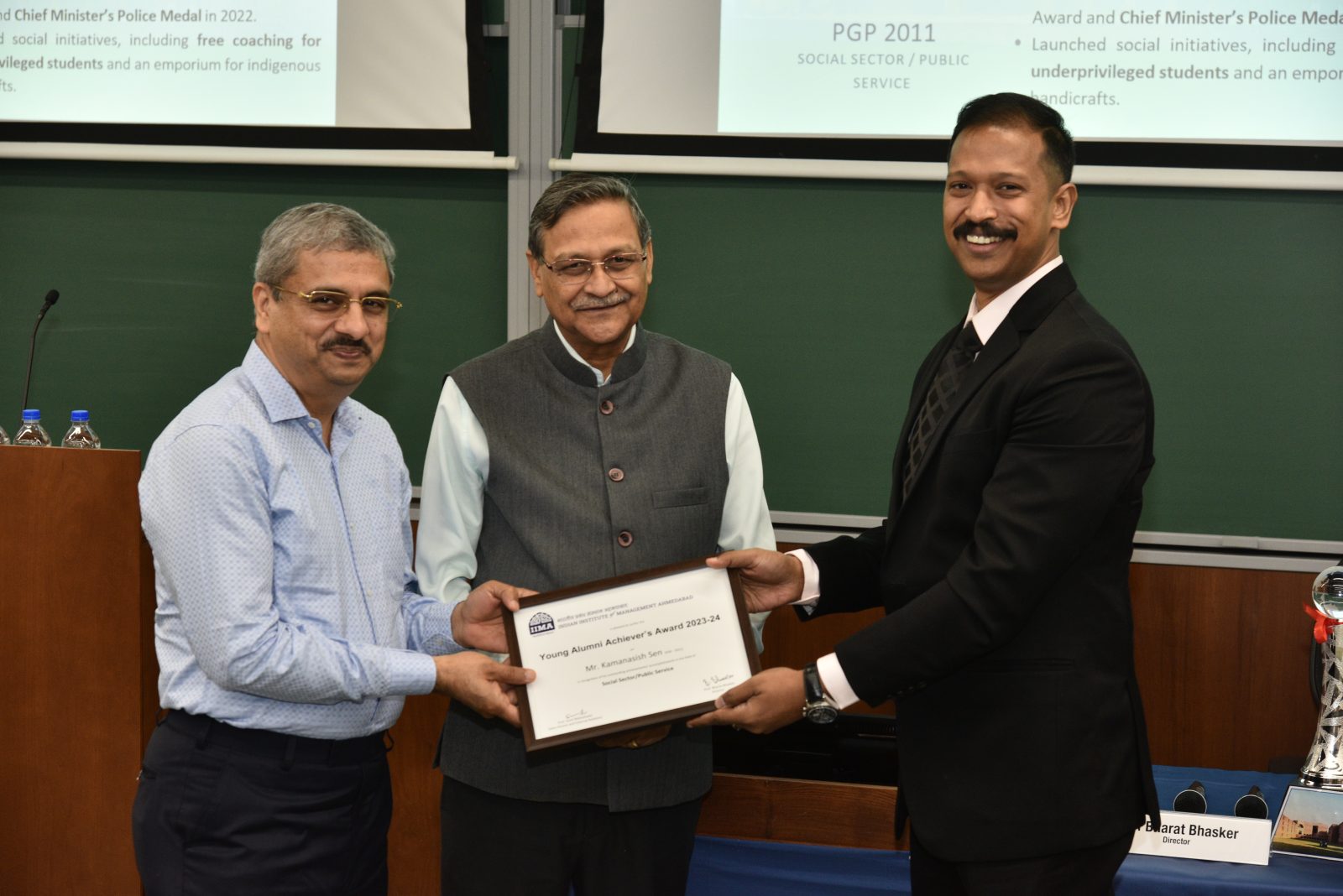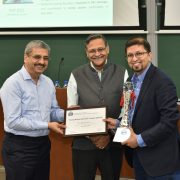SOCIAL SECTOR / PUBLIC SERVICE

Kamanasish Sen: PGP 2011 (Superintendent of Police (Indian Police Service, West Bengal)
Kamanasish Sen is a 2014 batch Indian Police Service (IPS) officer currently serving as the Superintendent of Police in West Bengal. As an IPS officer, he served as Superintendent of police in Baruipur, East Burdwan and Hooghly Rural districts in West Bengal.
During his tenure, Kamanasish has successfully dealt with mob violence, communal conflicts, industrial disputes and has been instrumental in curbing human trafficking in the region. He designed and implemented a Drone Monitoring System to maintain sharp vigil and ensure fair elections which was later included in the National Police Mission of Bureau of Police Research and Development. He has also been actively involved in community policing initiatives, fostering trust and cooperation between the police and the public.
Kamanasish’s hard work has been recognised and he has received various awards like 40 under 40 Award by International Association of Chiefs of Police (2022), National Award for Best Electoral Practices (2021-22), Chief Minister’s Police Medal (2022) among others.
Kamanasish’s impact extends beyond just his role as a police officer. He has been actively involved in various social initiatives, such as providing free coaching for engineering and medical entrance examinations for underprivileged students and football training for 30 tribal girls.
How has IIMA shaped your career?
First of all, being an alum from IIM Ahmedabad itself is a huge responsibility. Many times they expect you to bring sense into the work just because you are from IIM Ahmedabad. The Institute taught me punctuality. Doors to classes close at 8:59 which means you cannot go at 9:00. Secondly, the high ethical standards at IIMA really helped me, because throughout our PGP one or PGP two, if you have been caught copying, you are just simply given an F. Also it has given me a sense of duty, high ethical standards, and obviously an analytical approach.
IIMA is a management school and taking up public services, IPS is something which is unconventional. So what made you choose this path?
I always wanted to do something which creates an impact on the grassroots. To this day, I am very proud of the fact that this service impacts the public at the very ground level. I do believe that when they are distressed, a person who would usually avoid us, go to the police. So people who come to us, definitely have a lot of problems and solving the problems, helping them, propels me to keep going.
Also IIMA is a management school and not just a business school. So there are many courses over the wide spectrum of PGP one and PGP two, which are not just business but also about public policy. It basically gives you an analytical approach to whatever work you are doing. For example, you know professors who used to say, “Don’t give Global statement”, which is very common in IIMA lingo. So even in police meetings, when I am talking that is always in the back of my mind that I have to substantiate anything which I say with data.
What is your conception of policing?
Policing is not just about enforcement, it is also about making people realise that police are not their enemy. We are there to help the public. We are there to facilitate many things for the public. You know we are there as a friend if you need anything, if there is something which concerns you. Because I firmly believe that anyone who goes to the police station would be in distress, and he or she needs help. Why community policing? You see, there have been crimes against women where they have not come out or filed a complaint. There’s a lot of baggage hesitation in coming to the police. So that image needs to be shredded. For example, in any crime against women, the recording is being done by a female police officer or a female police personnel so that they can open up and talk freely about it because only when they come they report a crime to us, only then we can go to the crux of it and solve it. So for all these initiatives we try to come closer to the public. And I do hope that the people realise that we are doing it with some amount of sincerity and for the betterment of the society itself.
What are the skills that you need to be like a successful IPS officer?
I would say the most important skill set, which is required is courage. When you see a policeman in the movies. You have this idea of a policeman to be fit, to have all those physical dimensions. But to my understanding,a police personnel can be lean and thin, or he can be healthy, or anything, a real police man or a police woman, if he or she has the courage, they can be successful. And number two, is a sense of duty. It’s called the Indian police service. It’s not a job, it’s a service at the end of the day. So I think if these two things are there in the back of the mind, or wherever we are working, I think someone can be actually successful in whatever policing they are doing.
Your role also involves making tough decisions which are sometimes at conflict with what the community or sometimes the politicians may want. How do you deal with these kinds of difficult situations?
There are many tough, difficult, tricky situations. But I do believe that the rule of law should prevail. To be very honest, if you talk about a section of people,or about politicians, they know that an upright officer would never take a decision which is not in accordance with the law. All it requires is a persuasion on your part to make them explain that at the end of the day, this is for the benefit of the public. I keep going back to IIMA case studies. I still remember my PGP, one case study, which was about watermelon seeds. It was a negotiation class, and one of the groups wanted the watermelon pulp and the other group wanted the seeds, but both of the groups did not know what they actually wanted. So that is still fresh in my mind and I keep going to what does each of the group or each of the stakeholders want? That is very important to understand and then comes convincing or persuading them.
What advice would you give to somebody who wants to make a mark in the public service sector?
For students, first, do not take my advice, but one thing which they should really consider is that not getting envious of your batchmate when you see their vacation photos in Instagram, because then that becomes very difficult. What I want to say is that anyone who intends to make a career in public service, apart from clearing the exams and everything he should be, he or she or she should be, you know, should keep in mind that this is not a job. This is a service. Number two, if someone joins a police service, Section 22 of the Police Act says that a police officer is always on duty, so there are no fixed timings. You should be prepared for that. There are lots of challenges. I understand the challenges are there in any field but here the challenge is such that lives are at stake. But at the end of it, it’s a nice journey. When you go to bed, there’s something in your mind that says I have done good for at least two persons whom I don’t even have a connection with.
For example, people from all walks of life come to meet me, sometimes traveling 3-4 hours in a district. So at least I, and many of the SPS, have an open door policy, like you do not need a prior appointment to meet me. If I am there in my office, he or she has a right to meet me even if I’m not able to solve his problem, his or her problem, 100%. So at the end of the day, there is a lot of satisfaction that at least I have been able to solve someone’s problem, help someone impact someone’s life completely.
So what do you want to achieve personally and professionally now that you have received the Young Alumni Achiever’s Award?
I am so grateful to the institute for honouring me with the Young Alumni Award which makes me feel young at heart, at least. So next is, I would definitely love to actually get the Distinguished Alumnus Award from Ahmedabad. Jokes apart, what I want to do is increase my skill set. Professors at IIMA used to say “You should not get stagnant, you should always keep improving your skills”. So that is one thing which I really want to do.



